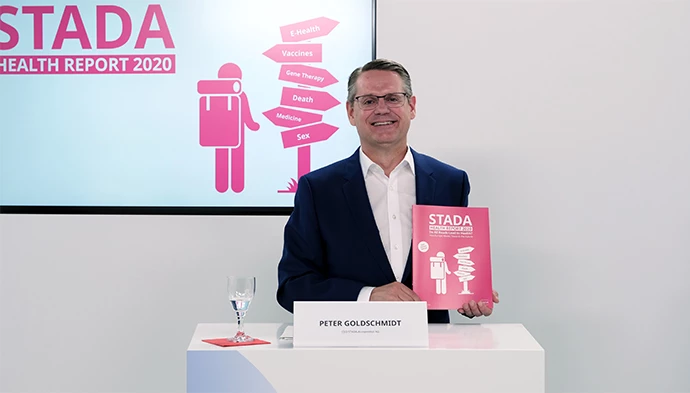Select your country
Websites worldwide
Select a country to go to the website of the respective STADA sales company.
Australia (1)
Belarus (1)
Belgium (1)
Bosnia-Herzegovina (1)
Bulgaria (1)
China (1)
Croatia (1)
Czech Republic (2)
Denmark (1)
France (1)
Hungary (1)
Ireland (1)
Italy (1)
Montenegro (1)
Netherlands (2)
Poland (1)
Portugal (1)
Romania (1)
Saudi Arabia (1)
Serbia (1)
Slovakia (1)
Slovenia (1)
Spain (1)
Switzerland (1)
The Phillippines (1)
United Arab Emirates (1)
United Kingdom (3)
Vietnam (2)
News
- 17/06/2020
- Press Release
STADA Health Report 2020: Europe demands compulsory vaccinations
- STADA Health Report 2020: A study with over 24,000 participants from twelve European countries on “How Europe moves towards the future” – including a corona special with more than 6,000 respondents from six countries.
- 61 percent of Europeans are satisfied with the medical care provided during the corona pandemic. However, predictions for the future look rather gloomy: 36 percent are expecting a financial crisis, 40 percent fear for their jobs.
- “The corona special of the STADA Health Report shows that recognition for members of the health sector has increased during the crisis. I strongly hope that the respect and appreciation for doctors, nurses and pharmacy teams will prevail after the pandemic”, says Peter Goldschmidt, CEO of STADA.
Bad Vilbel, 17 June 2020 – The second international STADA Health Report shows how people in Europe handle future-oriented health topics. A topic which has caused much debate across the continent is the possibility of compulsory vaccinations. A total of 82 percent of Europeans support the idea. In all countries, the share of proponents clearly outweighs the sceptics. People in Spain are particularly open to compulsory vaccinations with 94 percent in favour. Fewer enthusiasts can be found in Austria (72 percent) and Switzerland (70 percent). Despite great willingness, there is also ignorance regarding the topic: Only one in five Europeans know that they can be vaccinated against measles, hepatitis A/B, chicken pox and HPV.
Corona vaccine is a cause for concern
In the corona special of the STADA Health Report, 42 percent of respondents voiced their concern about the lack of a vaccine against the virus. In comparison, the fear of their loved ones contracting the virus and passing away worries 50 percent. Here, a definite difference between genders comes to light: 54 percent of women are worried for their family and friends compared to only 45 percent of men. Furthermore, 40 percent are afraid of losing their job, 36 percent expect the outbreak of a financial crisis due to the coronavirus. The fear of becoming unemployed is particularly prominent in Italy (48 percent) and Russia (53 percent).
Satisfaction with medical care during the pandemic
The corona special also illustrates: 61 percent of respondents rate medical care during the corona crisis as positive or very positive. By contrast, 15 percent criticised the conditions in their country, the rest remained neutral. The highest approval rates were reached in Spain (75 percent) and the United Kingdom (74 percent) – two countries which, at least temporarily, had to deal with particularly high mortality rates. The assessment of the healthcare system during the pandemic was significantly more negative in Russia (31 percent). Apart from that, 44 percent of respondents declared a newfound respect for the work of medical staff and one in four now have a better understanding of the importance of good medication.
“The corona special of the STADA Health Report shows that recognition for members of the health sector has increased during the crisis. I strongly hope that the respect and appreciation for doctors, nurses and pharmacy teams will prevail after the pandemic”, says Peter Goldschmidt, CEO of STADA.
Increased openness for digital medicine
As for the other topics of the Health Report, the STADA Future Index hints at a greater openness for digital medicine across Europe. The willingness to receive a diagnosis via remote treatment by webcam has notably increased in comparison to 2019: While 54 percent were ready to be treated remotely last year, this now applies to 70 percent of respondents. Belgians and Germans remain rather sceptical as “merely” 58 or 62 percent are ready for telemedicine respectively.
The expert for digital medicine, Dr Shari Langemak, states: “The corona pandemic has had a catalytic effect on telemedicine. Just a few weeks ago, remote treatment was mainly of interest for doctors and patients who are generally open to new technology. The pandemic suddenly forced a lot more people to give it a try. Treatment via webcam is no longer a niche product, but is increasingly perceived as an alternative to a trip to the doctor’s office.”
Genetics are a “red flag”
How open are Europeans towards other innovations in the medical field? Looking ahead, half of the respondents could imagine having their genes modified – provided a gene test predicts the outbreak of a serious illness in a few years’ time. The remaining half of respondents feel uncomfortable with the idea: 16 percent would prefer falling seriously ill over having their genes modified. An additional 16 percent would be afraid of other unforeseeable effects on their bodies and 17 percent would simply hope that the illness fails to break out. In general, the field of “genetics” remains widely underestimated by many. For instance, only 55 percent know that cardiovascular diseases are favoured by genetic disposition. Even fewer respondents are aware this applies to illnesses like Parkinson’s disease (38 percent) or osteoporosis (22 percent).


-
Download in PDF format
- Share




